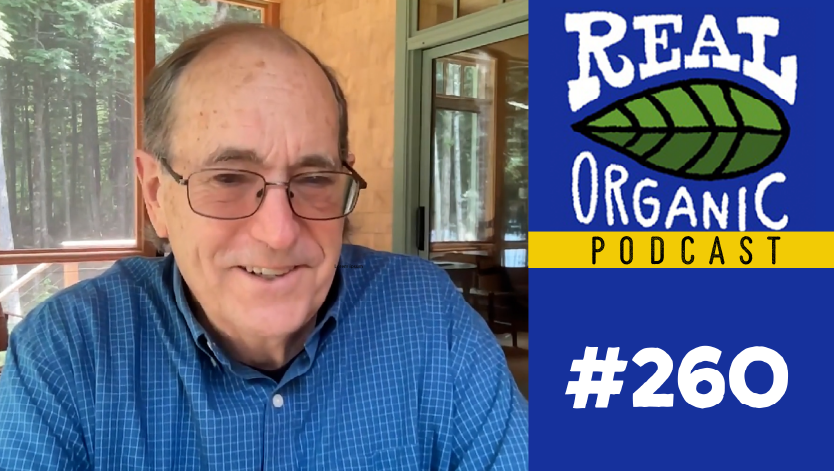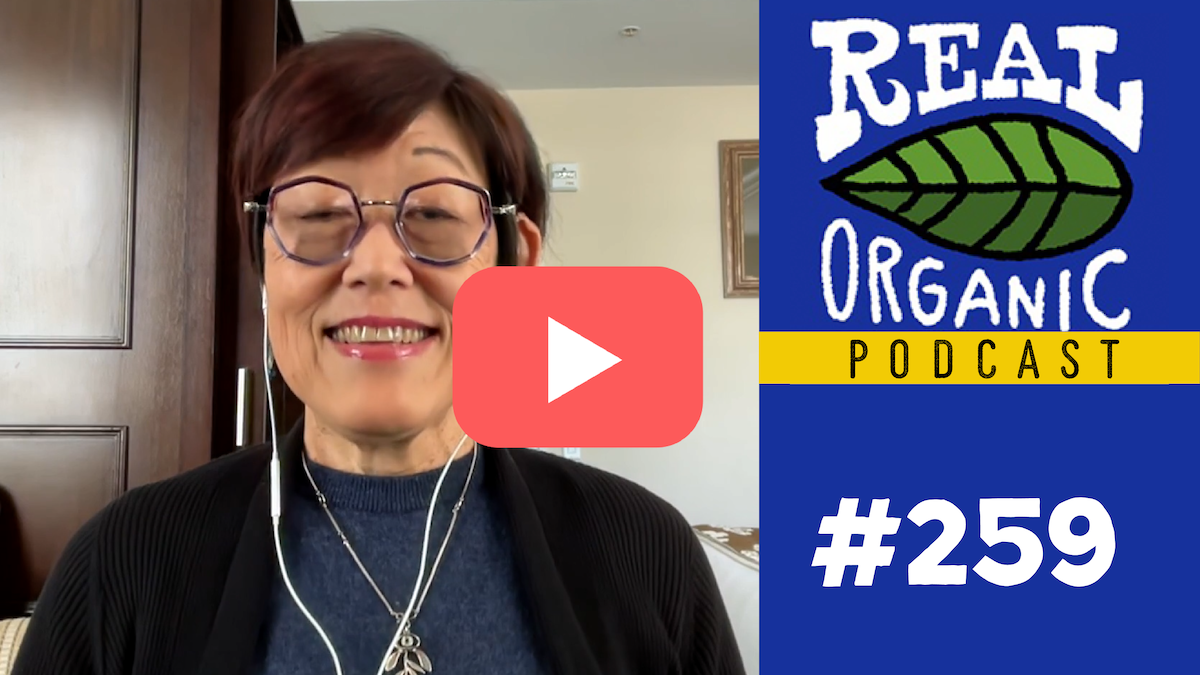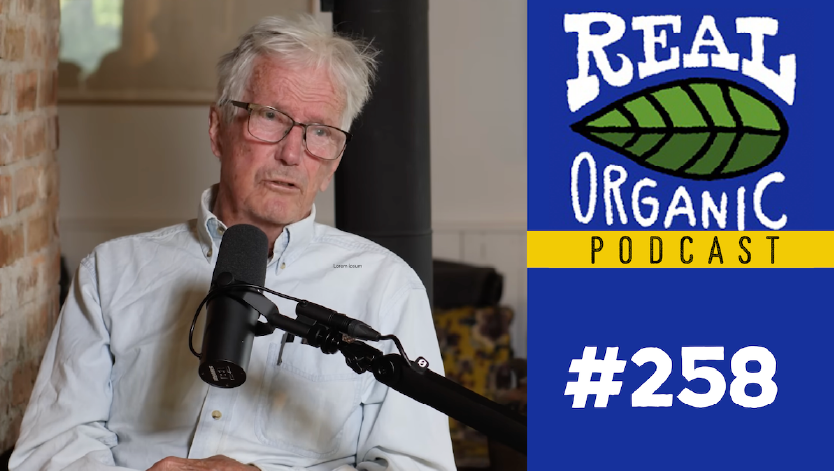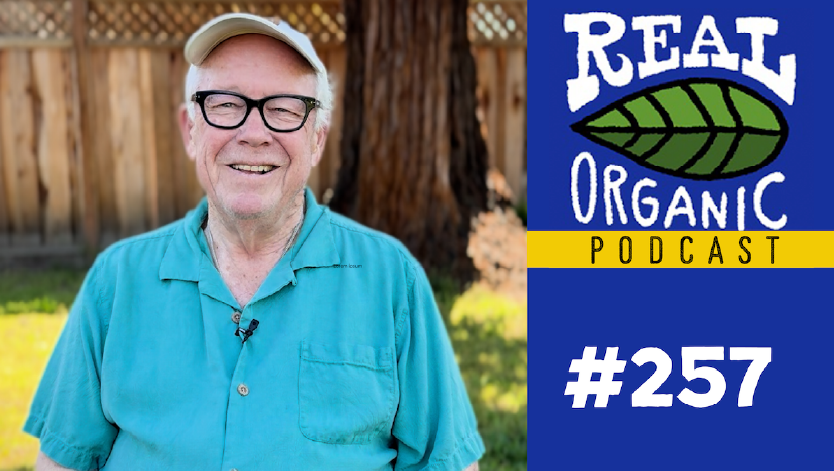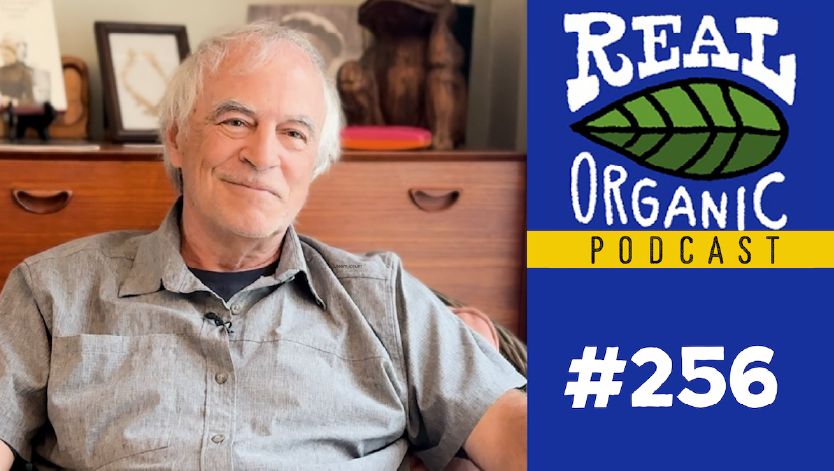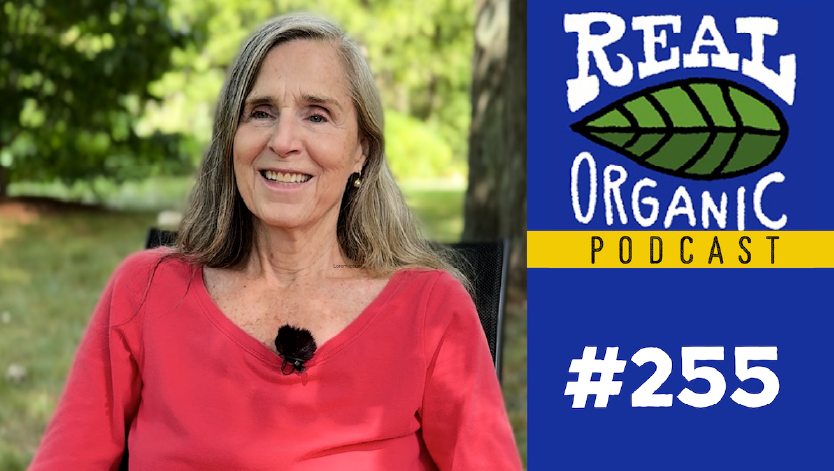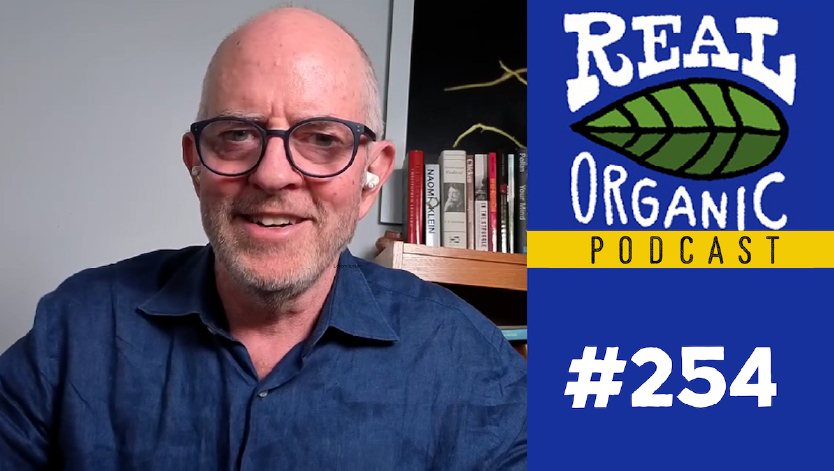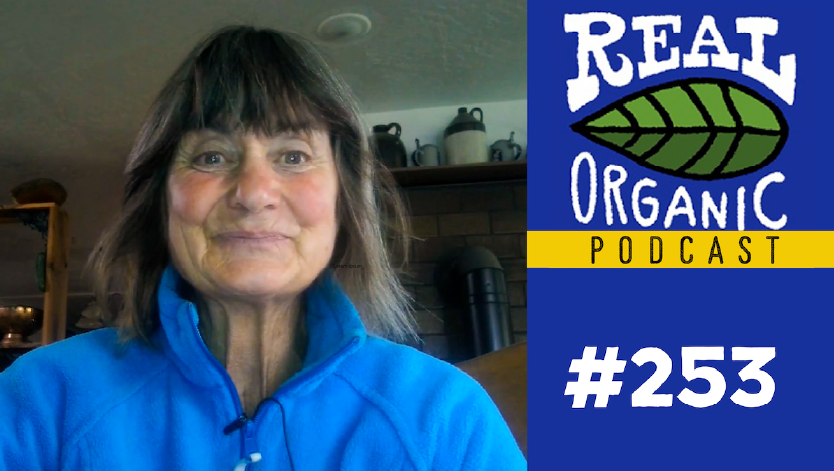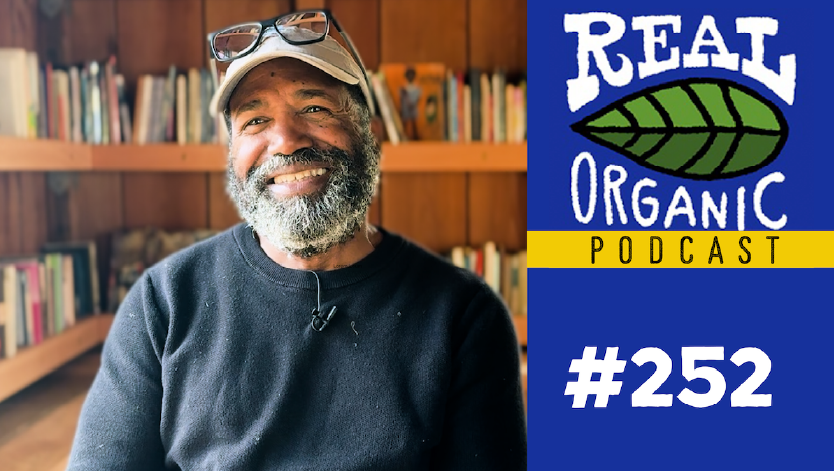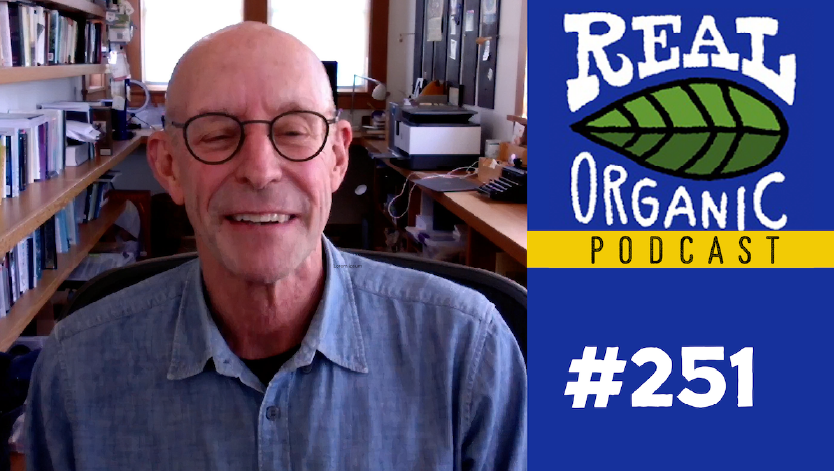Episode #162
Zephyr Teachout, Dave Chapman, + Matt Sheffer
Welcome! You can subscribe and download episodes of our show through your favorite podcast app.
You can also subscribe to receive the video version of each episode on our YouTube channel.
Our Zephyr Teachout + Dave Chapman “Breakout” Panel was moderated by Matt Sheffer of Hudson Carbon and recorded live at the Saving Real Organic Conference at Churchtown Dairy in Hudson, NY on October 14, 2023.
Zephyr Teachout and Dave Chapman Panel, Moderated by Matt Sheffer at Churchtown Dairy, October 14, 2023 Transcript:
Zephyr Teachout 0:00
Good morning.
Dave Chapman 0:01
Oh, they’re on.
Matt Sheffer 0:02
Morning everyone. My name is Matt Sheffer, and I’m the Executive Director of Hudson Carbon and Director of Policy at Foundation for Agricultural Integrity here at Churchtown Dairy. And I have here on the stage with me today, Dave Chapman, the co-founder of the Real Organic Project, and Zephyr Teachout, Associate Professor of Law at Fordham University.
Zephyr Teachout 0:28
You know what it was probably about seven years ago, I just keep forgetting to update my bio, it doesn’t matter. But I’m actually now a professor.
Matt Sheffer 0:35
Professor and former gubernatorial candidate in New York State. And we’re going to talk about the Real Organic Project through the lens of policy. So I’m hoping to have a provocative conversation. So to kick it off, Dave, I’ve heard you describe what’s happening at the USDA as a “crisis of democracy.” And that is, in some ways, the impetus for Real Organic, and sort of your reason for being. If you could run us through exactly what that means to you. I think that’s a good place to start.
Dave Chapman 1:18
Okay. Hi, everybody. I got into all this not as a policy person. I have been a farmer for 40 some years. And I actually had very little interest in policy, or the government, or the government’s involvement with organic. And when it first came in I, I felt it was a mistake to have the government create the National Organic Program. And I think I was wrong about that. But I was afraid that exactly what has happened would happen. And I’ve learned a lot since then. I got drawn into this because I happen to be somebody who grows tomatoes and wholesales them. And going into the wholesale market, I started to see a lot of tomatoes also certified that were hydroponic. And I thought it had been clearly established that that could not be, that that was, did not qualify for organic certification. There were a lot of them. And they were beautiful. And they were inexpensive, and they didn’t taste like anything. But that doesn’t actually matter so much in the market. It matters to the eater, but it doesn’t matter in terms of what’s available on the shelf. And there are a lot of other factors that come into that.
Dave Chapman 2:39
So I started to get drawn into discussing this with the National Organic Program, and the National Organic Standards Board. And for the first time in many years, I was kind of pulled off my farm and into this world of policy. And so you know, I kind of come at it from a really opposite thing of just sort of an angry citizen standing up at these meetings and going well, this isn’t right. This isn’t what we mean. And I am now the disgustingly expert at policy issues around organic, it was not my ambition to learn so much about that. But I had to indeed, one of my regrets is that I did not, I was not more involved in that 40 year period, that was a mistake. Because we needed to be paying attention. We needed to be more engaged as concerned citizens in order to keep this from going off the rails. And what I discovered as I got into it, is that things were much worse than I realized.
Dave Chapman 3:50
And I thought when we started that we were talking about one rule around whether or not we would certify food, fruits and vegetables grown without soil as organic, which if for everyone who understands what organic means. And I think you mostly do understand what organic means. That’s a complete contradiction. And, you know, organic must be about the fertility of the soil. And we knew that and it was in the law clearly over and over. And it’s recognized around the world. This is not some strange idea. This is what organic means. So I thought we just had a little regulatory bump, and I started some petitions and started to get friends to get engaged. And we actually had some some people who are fairly prominent signing those petitions. And so it became a deal. And we started to talk about it. As I got in, I realized it was all about the animals and the livestock also being falsely certified and then the grain fraud which was huge, which is what they’re using the feed the animals in the CAFOs, that shouldn’t have been certified. So now they’ve got a double whammy. And but they’re getting away with all of it.
Dave Chapman 5:07
And, and it seemed to be that we were helpless to change and just get the law enforced. And I’ve gone so far as to sue the USDA with a group of other farmers. And we lost, you know, and we appealed it, and we lost again. And we thought, okay, the courts are not going to protect this either. This is not good news. This is not good news. And on the second appeal, the court said, this is a I can’t think the term but it was non binding, meaning it couldn’t be used as a legal precedent. They didn’t feel very good about their ruling, but they also weren’t going to rule against the USDA. And they’re gonna go well, if the USDA wants it, so be it. So I’ve come to this, the creation of the Real Organic Project was because policy wasn’t working for me or, or any of us. And I felt that rather than be committed to policy reform, which I very much want. But I’m not spending my life working on policy or for I’m spending my life working on creating an alternative to a broken system. Because that seems easier, you know, to create a whole new, a whole new label and everything seems easier than to persuade the USGA to follow the law. So maybe that’s enough, you know, to get us started here.
Zephyr Teachout 6:32
Can I ask a question? I know I’m sorry. So can I ask a question about the lawsuit? Just we’re not going deep in the weeds, but were you suing them to do something?
Dave Chapman 6:46
Yeah, we were suing them to stop certifying that hydroponic is organic, and I didn’t invent this lawsuit. It was the Center for Food Safety.
Zephyr Teachout 6:56
Okay, great.
Matt Sheffer 6:59
Zephyr, your bailiwick is corporate power, corporate consolidation, antitrust. I think what Dave is, is talking about here can arguably be boiled down to an issue of corporate capture of our regulatory body for agriculture, the USDA, Dave talks about this idea of handing over the spirit of organic to a regulatory body like USDA. Was that was that sort of a foregone conclusion when that happened, that we’d be here today? How does how does this reflect in other aspects of, of our world?
Zephyr Teachout 7:36
Oh, hell no. And I love it, Dave, that you I’m so pleased to be here. By the way, I mean, my God, if I love speaking to the choir in such a sacred space, I mean, it’s extraordinary. And it’s a little chilly. But it means we have the wind at our back. So I want to talk about the little regulatory problem, because it is actually an extraordinary regulatory opportunity. I am part of the national global antimonopoly movement, which in the last few years, while a lot of other things have been going to hell has been succeeding. Joe Biden announced that one of the three prongs of his presidency is addressing the 40 year failure in the vision of markets that was brought on by the Chicago school and he called it a failure. It’s extraordinary. Extraordinary, not who you’d expect, but extraordinary. He appointed Lina Khan to head the Federal Trade Commission, and the head of who got her start looking at chicken farming and the problems in chicken farming and the problems in the rulemaking around the Packer and Stockyards Act. And Jonathan Cantor, to run the DOJ antitrust division.
Zephyr Teachout 9:11
So I want to talk about little regulatory problems because they’re really essential we give agencies like the USDA, the power and responsibility to enforce the law. And in the other areas of antitrust law, we have seen in the last, honestly year a radical change in the regulatory approach. Just this, just this summer, the Federal Trade Commission, issued along with the Department of Justice, issued proposed rules regarding mergers that overturn the last 25 years of bad merger policy, which is focused on consumer welfare and efficiency and is instead focused on a thriving democratic open economy. Those rules haven’t gone into effect yet. But that is what Dave is talking about the right people at the regulatory agencies can actually do extraordinary things to overturn the last, you know, since 1980, effectively, top heavy, Big Ag agribusiness model that we’ve had.
Zephyr Teachout 10:42
The key is getting the right personnel and getting the voices heard. So I mean, I focus more on the USDA and we have a lot of work to do on this. I focus more on the Packers and Stockyards Act and the responsibility of the USDA, which keeps saying it’s gonna do Bill sec, keep saying it’s gonna do is gonna do put out a rule that would basically ban discriminatory practices, period, by big meat packers. And we’ve still got a ways to go. But I’ll tell you on the FTC and DOJ side, I didn’t expect to go so deep in the weeds right away, but it’s really important. Personnel is so critical. Just a few staffers antitrust, by the way, an antitrust is not a Federal Trade Commission job. There are anti corporate power rules in every part of the government. They’re in the USDA. They’re in that HHS, they’re in the Defense Department. And they’re just these tools that are lying fallow. Tools that can be used to take up and create the kind of healthy economy thriving economy where people can work, or Real Organic farmers can actually thrive. So I, I mean, I know times are tough, but there is an opportunity here because we’re winning on antitrust, but we got a lot more work to do on the antitrust work inside the USDA.
Matt Sheffer 12:21
Thank you. That was that was great to get in the weeds there. You mentioned having the right people at these regulatory agencies. But we’ve heard from speakers today that perhaps that trend is going in the wrong direction for, for the National Organic Standards Board. And where it’s being populated with with folks from agribusiness, maybe to pass it back to Dave, can you sort of paint the picture of what that looks like where that trend has been going? And exactly sort of who the players are?
Dave Chapman 12:58
Well, when when I got when I first got engaged in the issue of the hydroponics, somebody asked me, Well, are you dealing with large corporations? And I said, No, actually, it’s just this one company from Mexico that seems to be doing this. And they’re they’re certifying their tomatoes as hydroponic as organic. And I was wrong as usual. And what I discovered because I served on a USDA Task Force studying this, and I was one of the token soil people. And at the end of it, we discovered that in fact, Driscoll’s was the biggest hydroponic organics certified product in the world. Driscoll’s is 70% of the US organic berry market by their own claim, which why you would say that out loud, because it’s clearly illegal. I don’t know.
Dave Chapman 13:59
But that’s what they said. And that was six years ago. So they’re a lot more than that now. And that’s when I heard that I suddenly realized why we were losing. And that we were going to lose, because the head of Driscoll’s can talk to Tom Vilsack anytime he wants, and I’m sure they have regular conversations. This is a major. They’re also 50% of the conventional berries. They’re major players in our food system. And we were not going to stop them in my opinion. That didn’t mean that we shouldn’t do exactly what we’re doing, which was organize and create as Regi would say an insurgency. But it did mean that it was very unlikely on a frontal conflict that we would win. So that that was what we realized we’re up against and with with milk, Aurora is a huge company. And you know, so these are big, big, powerful players. And I also discover it sort of through a backdoor channel that the top level of the USDA had been lobbied for some years on this issue. And quietly, I was told it wasn’t directly to Vilsack but probably to somebody in his staff. Like maybe his chief of staff who later became a paid lobbyist for the hydroponic people, for example.
Zephyr Teachout 15:22
Okay, so Dave and I got our start the same place. We both were farmhands at Kildeer Farm he was nine years earlier than me, apparently. We figured this out today. And then Jake and Liz from Kildeer are here today, which was a big excitement. So I feel like I have some ground. Jake who ran Kildare Jake with Liz who ran Kildeer, said the highest compliment is being fucking rugged. So we’re gonna be fucking rugged here because we are not going to take Driscoll’s lying down. I wrote about Driscoll’s in my book, Driscoll’s says sort of uses the classic tactics. It lobbies directly we’re talking regulatory policy. I’d have to fact check this. But I assume what most of the big companies do now is they also joined trade associations where they put up like, Harry with a cute dog, and a sweet little berry farm. And they have Harry with the cute dog and the sweet berry farm and they say they’re, they represent organic farmers, but the actual funding is coming from Driscoll’s. I mean, is that okay?
Dave Chapman 16:33
That’s correct.
Zephyr Teachout 16:34
Okay. These are just like basic early chess moves, you know, right. This is what they do. And then they are ready. When there’s an administrative turnover with personnel. They are ready. So we are going to take on Driscoll’s, and we are going to win.
Dave Chapman 16:56
Good, I can hardly wait.
Zephyr Teachout 16:57
And we’re going to be fucking rugged about it. Because, because one Vilsack you know, you remember he came out of 2010, kind of on his heels he’s got, he’s not looking good right now. Right. In the chicken industry, which we’ll talk about more later. And in meatpacking. I mean, the Obama history was a failure and was sort of open public failure. So he’s got something to prove. And we know it. Right. So there’s political. But, but there hasn’t been a lot of push right now in this administration on Vilsack himself, we can keep building more. Second, there’s a few people at the USDA that I know that are in there, and they are lonely. They want other people to be in there with them. So we’ve got to identify those young lawyers who want to take on the world and think the way to do it is x and say the way to do it is to go work inside because it really matters.
Zephyr Teachout 17:58
Like actually literally who is inside those agencies, who is slowing down the rulemaking. And then the other thing is finding common cause with the other, you know, the unlikely bedfellows the others who are who want different kinds of rulemaking in the USDA, because if you try to do it alone, you know, everybody isolated the advantage that you have in farming. I mean, I’m learning so much here, and I’m loving this, but the advantage you have in farming, that pharmacists don’t have that so many people in so many industries where the same thing is happening don’t have is people think they understand what you do, they don’t. But they think they understand it, it feels accessible. And people do care about healthy food. We know that, you know, even if it’s it ends up getting fake-ified. So I just don’t want to give up right now. Like, like, we can’t just say we’re just gonna walk away. Building the alternative model is really important. But I actually think there’s a real possibility in rulemaking in this USDA. In the next six to five years.
Dave Chapman 19:12
I’m ready. I’m ready. Right. I have never given up. I haven’t we obviously have to reform government. We have to, there’s too much power there. There’s too much that needs to be done. But in the meantime, it’s been my belief that we can’t reform government until we build a movement. We have to have a lot of people. I was at a meeting with Shelley. Shelley couldn’t make it today. But she really wanted to be here. I was at a meeting with her. And she was talking about the Green New Deal. And actually, the meeting was at Abby’s house. And I said, you know, Shelley and McGovern cannot do this. Without us without a big movement behind them. There’s not they would just be political suicide. If we want to See these changes, we have to organize just the way, Kristin said that, that the farmers can’t do it without the eaters. We have to be together in this or we will fail. So I love it
Zephyr Teachout 20:12
So, occupy the rotunda at the USDA.
Dave Chapman 20:19
I’ll come with you.
Zephyr Teachout 20:22
But I agree, I don’t disagree with you. You can’t do it without. Without, it doesn’t have to be everybody. Right?
Dave Chapman 20:30
No.
Zephyr Teachout 20:31
Yeah.
Dave Chapman 20:32
Actually a relative handful. But but we do need a committed core.
Zephyr Teachout 20:36
Yeah.
Dave Chapman 20:36
Who will come and join the occupation of the USDA? You know, I hope you’ll join us there.
Zephyr Teachout 20:42
Well, I mean, you look at network neutrality, which the successes around taking on you know, the taking on network neutrality, that was a movement, but it wasn’t like, everybody, it was just an organized, dedicated movement that really changed the rulemaking, during the Obama era. Got undone, it’s getting redone. But but it’s an example of like, how a we’re not going to Margaret Mead it up. But yeah. A small crew can actually effectively get regulatory change.
Matt Sheffer 21:24
You talked about Packers and Stockyards Act. Could you give us, give us a sense of how that fits into this picture for, for those of us who don’t know, know what that Act is all about?
Zephyr Teachout 21:38
Yep. Okay, what do we got it? We got like, I got two minutes to answer this. In the in. Okay, I’m gonna go up a level and come down for a second. In American history, one of the most essential ways to break up corporate power, besides actually literally breaking up corporate power, is requiring those companies that have basically that sit in the choke point of an economy to not discriminate. We took on the railroads in the 1880s. Before we even passed the Sherman Act. The first rule was the Interstate Commerce Act, which required the railroads to treat all farmers the same and therefore not govern them. Because if I can treat this farmer one way and this farmer another way, I own, I own them. Right.
Zephyr Teachout 22:49
So the first antimonopoly federal antimonopoly movement is non-discrimination. Railroads. 1917. We got a problem. Four meat packers control the system and there is a public move to say non-discrimination. They must, the Packer and Stockyard Act, cannot use unfair and discriminatory practices. So highs and lows, ups and downs, but those four meatpackers, then by 1976 control just, you know they’re still big, they’re still a problem, but it’s 25% instead of dominating. The Packers and Stockyards Act actually works at enabling farmers to be able to come to a meat packer and not be discriminated against. And then you have the Reagan Revolution. You have the ascendancy of efficiency you have both agencies enforcers and courts, both say all of these rules should be interpreted through the lens of consumer welfare.
Zephyr Teachout 24:07
However and so there is a massive rolling back of rulemaking under Packer and Stockyards. Under Obama, Vilsack does all these tours, meets with farmers, the farmers are terrified and still showing up. Terrified because when you can discriminate if you speak up you’re, you’re truly canceled. And but they speak up and they have proposed rules and the proposed rules get don’t actually happen. We still have these proposed rules, we’re ready to go proposed rules that would reassert that the big concentrated meat packers cannot discriminate between different people coming there. I use that as one example. But the non-discrimination rule is really critical in Ag.
Zephyr Teachout 25:08
I mean, you guys know this, that in order to build I mean, this is the chicken and egg question is that part of building political power is building those people who can speak up. And when people are dominated because they are discriminated against, there’s just so much fear out there. I mean, farming is so full of fear, I still I spend, you guys aren’t a fearful bunch. But I spend, most people I talk to are a lot more overcome with just terror of what is going to happen if they actually speak their mind, given the dependency on Tyson or somebody else. So that’s sorry, I took way too many minutes for that, I thought I could do it two. But, but it would be a really big deal it because it’s a big deal for the Packers and Stockyards Act. But it’s also a big deal for saying non-discrimination is a key American principle that we need in every single part of our economy, when you have a choke point control, maybe we allow you to exist, but if we allow you to exist, you cannot discriminate and therefore govern that whole economy.
Matt Sheffer 26:12
That sort of that idea of a choke point, I think, relates to what’s happening in organic dairy. And so Dave, I thought maybe you could speak a little bit about the crisis with with Horizon and the Northeast, and how that’s playing out and kind of weave in the issue of non, you know, not enforcing the letter of the law. And, and the, the way that that’s played out in Industrial Organic.
Dave Chapman 26:45
So one of the things that I saw was back not that long ago, maybe 2016, it looked like most of the dairy in Vermont was gonna go organic, in the next 10 years. It was the one place that a small farm and even the big farms in Vermont are small farms, it was the one place that a small dairy farm could get a pay price in which they could survive. And it was pretty exciting. And all of a sudden, a lot of small farms were making a living and able to replace their equipment and all those good things that, that are the sign of a healthy business. And that was there was a tipping point, right, right about then a little bit after, but by 2018, the pay price was plummeting. And it was plummeting because large CAFOs concentrated animal feeding operations, were now starting to flood the organic market with cheap milk. And they could make it cheap, because they were CAFOs. They were very efficient at a monocrop thing.
Dave Chapman 27:56
And also, they were paying a very low price for their organic grain that probably wasn’t organic. And they were mostly feeding grain, not not grass. So the whole thing was wrong. There was a wrongness to it. And the outcome of that is that the dairy farms went from making a living to just barely surviving or not surviving. We’ve been losing them steadily since then. And it really came to a kind of a tipping or let’s say, it became very visible when Horizon which is a big company owned by a much bigger company owned by Danone, which owns Dannon and, and other things. They’re the second biggest dairy company in the world. And that’s a very interesting story too.
Dave Chapman 28:53
We’re okay. Okay, I see thumbs up from down low. Okay. So Horizon made the decision to cut off stop buying from all of their suppliers supplying farms in Vermont, New Hampshire, Maine, and the eastern part of New York. And it was, I can’t remember, 97 Farms, I think something like that were going to be cut off and in x months. For these farms that was essentially a death sentence. They were losing their contract. It ended up that many of them were picked up by Stonyfield and Organic Valley, but mostly without contracts. So it was they were just living day to day, right. They were in incredible peril, and they were already going out of business. That’s the bad part is that they were already operating off of their past glory, not able to maintain their equipment not able to improve. So, this became very visible. And, I got involved in it. We actually did a symposium about it.
Dave Chapman 30:17
But one of the things that was fascinating to me, I don’t know if anybody knows who Emmanuel Faber is. But he was the CEO of Danone. And he was very visionary. And he was the most visionary CEO of a large multinational corporation I ever encountered. And he was truly an inspiring speaker. I wished I could talk like him. And he was, had this vision of Danone becoming a company actually dedicated to the good of us, and a company actually dealing with creating food that was healthy. And working with local economic ecosystems. I mean, it was, it was pretty exciting. And you go, is this real? Is this true? Or is this just talk, and if it was just talk, he was awfully good at it. And then they had a down year, and he got fired. And it’s, for me, it was it was crystal proof that what we’re dealing with is the system, and not bad people and good people. Because, okay, he was a good person. And as a result, he lost his job. It isn’t like, if we could only get a good person to be head of the USDA, we know we could get someone who’s even worse, no matter how bad they are. But the point being, if they were really good, they’re not going to last they’re gonna get they’re gonna get chewed up and spit out by the economic forces that are driving that. So I’m excited by Zephyr’s idea that with enough sunshine, right, enough public scrutiny, enough of us being involved, maybe we can change that. But I don’t think it’s just a matter of getting a good person.
Zephyr Teachout 32:07
I don’t disagree. I mean, I just Yeah, I just mean that when there’s those moments, we also need to be there. We also need that staffing there.
Dave Chapman 32:17
And we do need good people.
Zephyr Teachout 32:18
We do need good people.
Dave Chapman 32:19
But they need us.
Zephyr Teachout 32:20
So, so just two things, I completely agree with you is that in the 70s, a lot of the left made a bargain. Maybe it wasn’t even seen as a bargain by some at the at the time. But the consumer rights movement was basically if we can get our policies through, we’ll work with big companies. And we’ll work with big companies because if we can work with McDonald’s, and make all of McDonald’s, organic, then we’ll have done it very quickly. We’re not dealing with the sort of the decentralized market. And it was a really core part of progressive ideology for the late 70s. Not everywhere, but it’s the dominant part is the sort of consumer rights vision, work with, hold accountable, Unsafe at Any Speed, hold accountable big companies and transform those business practices by getting a seat at the table. It’s broke. And Then There Were None. Because when you are now down to just, just three, two, you know, berry companies that are just financial companies with a berry guy, it doesn’t matter, you can’t, you don’t have the seat at the table anymore. You basically if you allow those mergers to happen.
Zephyr Teachout 33:49
And so part of what has happened, part of the way that Danone gets in the position it does is that we’ve had 40 years of merger policy that have allowed just merger after merger after merger, vertical, up and down the supply chain and horizontal. And that combination across the board then creates I mean non-discrimination is a partial answer. But we really do need to break up this power because there is nobody who I totally agree with you there is nobody who can sit in that seat that is ever going to be the advocate for organic and the other thing is I guess I just see maybe a different way to put it is the, but the cause that we’re talking financiers because this is basically the labor and labor law is the law that controls how workers can organize. Antitrust and antimonopoly law is the way that stops capital from organizing. So we need both and we need to do a lot better job at, at taking on capital and capital concentration at its root.
Zephyr Teachout 35:07
And so when I come here and see the extraordinary I mean, this is just so amazing what’s happening here. But capital wants us to think there’s a berry problem here and a dairy problem here, and a Uber driver problem here and a pharmacy problem here. And they are totally sector specific. But what we have is a problem of core democratic health and power. And so it is only when we join together and recognize, and I believe, make this a whole, whole of government antimonopoly movement that we can succeed and not just keep it every sector where Driscoll owns USDA, and you know, Verizon owns another, another part.
Dave Chapman 35:54
I just want to say that I agree. And, and I agree because Zephyr has taught me this, although today’s the first day we’ve met, but I’ve read her book, Break’em Up twice. And it’s so important and significant in understanding what the problem is. And every step along my way, I kept going, Oh, this is bigger than I thought, Oh, this is bigger than I thought the problem kept getting bigger and more connected to all these other problems. Until in the end, it feels like it’s all one problem. And, and I believe that it’s true, that a key part of that one problem is that we have a vast concentration of power in the hands of a few and they don’t know how to handle it responsibly. And they, they can’t, it’s it’s too much energy. So we need to diversify our financial system as much as we, and our political system as much as we diversify our soil.
Matt Sheffer 36:57
Thanks, Dave. Well, let’s talk about what, what we can do as as individuals and Dave and Zephyr jump in here, but I you know, we, we’re people we all eat every day. We know of this concept of voting with our wallet when we go to the supermarket, but the concentration and power that Zephyr is talking about is such that when you go when you go to a supermarket you see what is you know, what looks like a whole diversity of of labels, but you know, the reality is they’re owned by very few. What, what can we do you know, beyond informing ourselves about what we buy in the supermarket. Beyond this call to understanding and knowing the story of your farmer, what can we do as people to, to really join this this movement and see the whole picture?
Dave Chapman 38:04
You go first Zephyr.
Zephyr Teachout 38:06
Well, where are people from here? Just shout it out. What’s the small group? Okay. Okay. Okay, so you go talk to Becca and you go talk to Mark and you go talk to Pat. I missed some, I’m talking about your congressmembers. No, and you’re shaking your head, why?
Zephyr Teachout 38:42
You should be rude! Come on. Well, let’s be real what?
Audience (indistinguishable) 38:45
There’s one word that defines the problem and it’s money, and all of our elected representatives, with very few exceptions, like (Senator) Tester, are owned by money. They’re not owned by the people who vote for them. The only example that’s gonna work is somebody in your group were the resistance and we can only wear them down by wearing down the establishment. And the idea that appointees and the Department of Agriculture are going to help us win, is to be admirable but fantastical. The only thing we can do is educate people and encourage them to buy good food.
Zephyr Teachout 39:34
Okay. Okay.
Audience (indistinguishable) 39:36
Put that at the progressive forefront. You’re talking about the government and antitrust, Albertsons is buying Krogers.
Zephyr Teachout 39:42
They are doing everything they can to stop it.
Audience (indistinguishable) 39:44
They’re not stopping it and you know it.
Zephyr Teachout 39:47
But, but the way we get no this is this is a really important conversation. I think the way that we get the new laws if, if they don’t stop it if they don’t stop it because the FTC wants to stop it. If they don’t stop it, that gives us, that gives us the proof, so, so this is a really important conversation, this. So what I believe is that we cannot I believe we should absolutely vote with our feet, whatever you want to, you know, go and that matters. And I believe that will never be sufficient, that it has to be political. And so the political story is not sitting and asking nicely and then going away. But it is going to Pat and saying you write the letter to Vilsack. And if the letter isn’t written, that group of four then has that story, you walk through, you show what is not happening, and then you you work on the antimonopoly movement by building with the local pharmacists who are no longer able to survive.
Bill 40:47
There are none left.
Zephyr Teachout 40:48
And no, well, there’s none in Columbia county. Yeah.
Bill 40:50
When I moved to Massachusetts from abroad, there were 379. local pharmacist, there’s now 19 family owned businesses,
Zephyr Teachout 40:59
and those pharmacists are mad. And so when you join pharmacists, and I’m not willing to give up.
Bill 41:05
They’re not mad, they’re looking for the next payday to sell it to CVS or Walgreens. So that’s their only choice, not because they want to.
Zephyr Teachout 41:12
Right, exactly.
Bill 41:13
Only choice.
Zephyr Teachout 41:13
Yeah, no.
Bill 41:08
So the I mean, I write to, we have, I live in Massachusetts, I lived abroad for 23 years, people asked me why I came back. I said, I missed America. I said, I still do. Okay, this system is so effed up. It’s not real. And I write two. We have two senators that I write pretty highly Markey and, and Elizabeth Warren, and my local Congressman’s, okay, they don’t answer me anymore. They don’t answer me anymore. And I’m not even rude to them, like I’m being to you, they don’t answer me anymore. Because there’s nothing they can do about the problems that I bring to their attention. There’s nothing they can do about education, there’s nothing they can do about gun safety. There’s nothing they can do about food safety. There’s nothing they can do about extortive rights and, and commercial practices, by everybody, by the banks, the telephone companies, these are all regulated industries, and there’s nothing they can do. And unless we’re willing to start, like the bad guys did with the Federalist Society 30 years ago, we don’t even have a judicial system left.
Zephyr Teachout 42:22
Okay, so I’ll just Yeah, and we can continue. But I think it’s an important conversation. So who I take inspiration from are the progressive populace in the 1880s, who were losing. What? But they did not give up. And they built a story in dissent. They built the record in dissent that later provided the foundation of the laws in the 1940s. So yes, it’s a 60 year plan. It’s not a, it’s not a two year plan. It’s not like and then tomorrow, everything will be better. But it is actually seriously engaging as political entities and not just as consumers, which I think is absolutely essential.
Matt Sheffer 43:07
Dave, do you have anything to say? I know you do.
Dave Chapman 43:11
This is a very important conversation. It’s right. It’s a very important conversation. And you know, actually, my heart is with Bill and and with Zephyr here, I do believe I agree with Bill that we can go to the great people in Congress, and we can try to get other great people. But I agree that this is not going to be a quick solution. It’s not going to look like a solution. And we can create something that will start to look like a solution ourselves directly. And obviously, that’s why the Real Organic Project exists. Before when we were Keep the Soil in Organic, we were attempting to reform the USDA, that was our purpose. We were I mean, talk about a grassroots organization, we had a budget of zero, we had a leadership of zero, it was just almost these spontaneous gatherings of farmer protests. But we failed and I kind of figured we’re going to fail. And that’s okay. Because in that process, we came together.
Dave Chapman 43:11
We had 60 farmers from around the country go down to Jacksonville, Florida, to testify. It was beautiful. The people who were on the stage this morning? That’s what it sounded like when all those 60 farmers got up and testified. I was like ready to weep. Surely, surely these people who don’t know very much who are chosen to be on the National Organic Standards Board will hear them and they did not. Not a single one change their vote. We went in with seven votes we came out with seven votes. But those 60 people heard each other and, and a movement started to recoalesce that once started, right? And we’re all part of that movement. So and, and I do believe we can’t abandon government, even if government has abandoned us. We have to keep working and trying. So I’m excited to have Zephyr here and hear her ideas because they’re fresh ideas for me. And you know, she’s been thinking about this while we’ve been thinking about how do we get real coffee up here? How do we get real tomatoes here? Right? We all want the same things. And Zephyr wants those too.
Zephyr Teachout 45:18
Yeah, no. And sorry. Yeah. Like I, I totally respect where you’re coming from? Totally. I am more worried about apathy and people checking out than I am about anything.
Audience (indistinguishable) 45:33
That’s that’s the second problem. You know, we don’t have we don’t have, you know, in 19, the first year, the first Earth Day year, my wife and I lived on 12th Street in New York City. We went up to 14th Street. And I said, This is it. We’re going to be okay. We’d stopped Nixon, just about. We’re stopping the war, just about and now we’re going to save the planet. And we had Republicans leading that, leading that. It’s all gone. Nobody cares anymore. About anything except for money. I’m sorry, we are a corrupted Empire at the edge. Now. It might change, but it’s gonna have to change fast. We don’t have 60 years.
Zephyr Teachout 46:19
I’m not disagreeing. But I do want to say I come from money in politics. Like, that’s where I started. Money in politics. There’s no question, that’s the root issue. There’s no question. Right? I came to corporate power, because I think we should go, not we should be taking off, taking on power where it lies. Not just saying once you’ve accumulated power, you can’t give it which we also have to say, I was cited all over the dissent of Citizens United. I am there with you on money and politics, right. But I think it is important to call out the fundamental illegitimacy of concentrated power itself, not just the spending of money on concentrated power.
Charlie 47:04
I’m just curious how much of it is a consumer problem? Because I’m, I’m a large business, I’m a consolidator and my warehouseman said, “You guys only care about the money you send those jobs overseas?” And I said, “I don’t do that you do. Because you got to Walmart to buy your shirt. Not made by a work union worker, but by someone being paid, you know, two bucks a week.” So my question is, how much does the consumer own of this issue?
Zephyr Teachout 47:39
I think it is. I use this word sparingly, but maybe I’m not I think it is a gaslighting. I do not think that it is going to be I think, we have individual and collective responsibility. There is power in some consumer movements, but the idea that it is a consumer problem, as opposed to the idea that there is nothing more fundamental that a government does than organize how an economy works. Nothing more fundamental, nothing more fundamental. That is like the core job. Right? There are always rules, there’s rules at your farmers market. There has never been a market without rules. Right. Rules they organize. Right? Exactly. Right Reagan and they created new rules. And then they gaslight people into saying if there’s a problem, it’s the consumers problem. That’s right. But, but I gotta tell you, here’s why I’m going to be you guys can all tell me I shouldn’t be hopeful. But here’s why I’m going to be hopeful:
Zephyr Teachout 48:40
In the last two years, I know you can laugh. This is the this is the fun. This is the, this is the funny. It’s a gambler’s hope it’s not a probabilistic hope. It’s a gambler’s hope. You know, we got a seven and eight playing. I’m staying in the game. That’s only speaking to the 4% of you who are poker players. But you know, it’s not it’s not it’s not an ace, king. But they, the last three years, it broke. They had one job. And they were wrong about that one job, but their one job was to keep prices low. In COVID, the supply chains broke, that market they built it broke, and people died because it broke and there’s an opening here to say like they didn’t even they can’t even work on their own terms. Tyson’s profits are going up. You may have seen yesterday’s news. It’s not a big surprise, though. You know, Big Ag profitability is going up. Their system was supposed to keep, you know, all the money flowing to consumers. It doesn’t work. It is not consumers problem. It is our collective job to organize an economy where you can have a free and fair and open economy. I do not think it is a consumer problem.
Matt Sheffer 49:57
Like we have another question comment from the…
Audience (indistinguishable) 50:00
Yeah, so I’m definitely with you on consumer choice being a limited kind of way of organizing action. And that actually strikes me it’s like a very capitalistic way of looking at the food system. And that can exacerbate existing inequalities and who has access to stuff like, who like, who has the money to buy organic, you know, who has the time to cook slow food? These are all like questions that I think need to be considered along with everything. And another thing that strikes me is, it doesn’t seem like I feel like there’s a binary that’s been, come up in this conversation where it’s like, either you call your representative, or you totally give up on politics, and like, just buy organic, but it seems like the conversation should be around, like direct action, you know, like, unions, they’re able to strike. You know, that’s where they get their very concrete political power. And I’m wondering where that action comes within farming? And what are the concrete ways that we can organize that hold systems of power to account and make it so that these politicians who are in the pockets of big businesses have no other choice, but to come to the table and negotiate?
Zephyr Teachout 51:21
I have some thoughts, but I’ve been chatting away.
Matt Sheffer 51:22
So go for it.
Zephyr Teachout 51:24
So, the, in the, in the 80s, 90s, this sort of supply chain, consumer strike had some successes, sweatshop successes. Nowadays, it is really hard to do a consumer strike. It’s hard because of the structure of social media. So people are like, Yeah, I’m consumer striking, you know, and then the Chick-fil-A strike lasts for like, if you’re lucky six weeks, right? The best example of this is the major, extraordinary organized strike. Small businesses, big businesses, mostly big businesses, striking Facebook, organized by Color of Change. It lasted three months, they had everybody on board, because of how Facebook was delivering up violent radicalizing content, you got to stop this. They just outwaited them. You know, and that’s like, as organized as you get. That’s not just consumers, that’s money, that’s advertising dollars, it is really hard to have that effective strike. What I do think is more effective is going I mean, this is not a full answer.
Zephyr Teachout 52:42
You guys are gonna figure this out. I don’t know how to figure it all out. And I don’t think you should I appreciate your saying it’s not either or it’s not like you shouldn’t also engage in these, I just want to be honest about there is some evidence that people who engage in consumer strikes also feel less obliged to engage politically in whatever form, whether that’s, you know, being nice to Mark Molinari, which has got to be one of the most maddening or, or whatever, we know, whatever form so I think there is it’s not costless. The sort of consumer, the consumer strike model, but going straight to power. Where power lies the agencies, I mean, this is the sort of is a less aggressive model, but I like and you can tell me what the opportunities are in the state level, but in we’re starting to have antimonopoly successes at the state level in legislation. We, I you know, Minnesota, we got some Minnesotans here, just changed, change some significant rules at the state level. So, I don’t know if you can do that with certification, though, you know?
Dave Chapman 53:52
No, it’s really, it’s really hard to create change. Anyway, we’ve, we’ve tried everything. We called for a moratorium on the certification of hydroponics back in 2016-17. And we got we got a meeting with the head of the Agricultural Marketing Service, which is, who runs the National Organic Program. And she was wonderful, actually a wonderful person. She was one of those good ones that that snuck in. And when I met with her, she said, Well, I wrote the letter to call for the, the moratorium on certification. But the lawyers here said we’re just gonna get sued to death. So I’m not allowed to send that letter. Right? And it’s an example I have a good person who, who really gets it isn’t enough. We need a movement, but I don’t know. Honestly. I don’t I wish I had some clear answers of like, well, if we just do this, that’ll happen, but I don’t. So I think that, that political activism is great. And, and I support it. And I know that we have many ideas of what good might look like.
Dave Chapman 55:18
But I think we don’t have much disagreement about what good would look like we might have disagreements about what the political landscape might look like, but not disagreements about what we want to get to in our food system. But I also think direct action, obviously, we do choose every day what we buy, Zephyr has convinced me that that’s not enough. And I believe that’s right. But it’s Oh, is where we must start. And, you know, somehow, to get to the other to get to the political action, we have to have a movement, we have to have a lot of people who are willing to speak together. And that’s what Kristin is talking about, about just who subscribes to her CSA. She’s an activist farmer. And she’s getting people to think about their food, what they eat, how they obtain it, and, and she offers excellent food, you know, grown in a way that that all of us would really support. So for me, that is a model for change. It’s not just a model for better food for her customers. It’s a it’s a model for creating a conversation that we hope, you know, spreads and, and in a, you know, like a fungus mycelium that it spreads and and affects others and affects others and affects others.
Matt Sheffer 56:39
So in the last few minutes that we have, yeah, I think, you know, just to wrap it up here. It sounds like we need to be more politically active as as citizens, as eaters. And yeah, I mean, I think, I don’t know, is there any, any? Is there anything more we need to say about that? I mean, I,
Zephyr Teachout 57:09
I just thought, Okay, I’ll just end with like, what happened to us, nationally, and globally, in the 80s. Is, they took away, they cut out our tongues, They took away our language, they took a way to talk to each other. They took away the sources of community, they took away our sense of authority, where we feel like we have to know everything before we can speak. They took away the vision of what it is to be a human. And in and so we’re mad and depressed, right? There’s a lot of legitimate, I’m not saying you’re depressed. Better to be mad. But, but there, there’s and, and they took away a sense of like, what is the way out. And so why I go to the 1890s is because those guys, black Americans had lost what what our country had promised to regain. Women fighting for the right to vote, had been losing for 40 years. And big business had just taken over. And they did not stop fighting. And so I don’t know, like, we’re going to try all these different tactics. We’re gonna stay fertile and diverse in our approach, and come together in these extraordinary moments where we can do this. So, but, but I am not willing to give up on the power of the fact we are suing Google now and I know Big Ag spends money but I gotta tell you, Google spends a lot of money. We are suing Amazon and I know Driscoll controls the USDA, but Amazon has been controlling to x policy in this country for a while like there are these cracks in the system and like letting the light through and we are going to go towards that light.
Matt Sheffer 59:16
Thank you, Zephyr.
Matt Sheffer 59:23
Thank you, Dave. I hope you guys enjoyed the conversation. Abby, would you like to say something?
Abby 59:44
The business, when the, when sorry, when it went became when capitalism became bigger than the merchant? There was the merchant and the customer. When capitalism won, they named us what they will wanted us to be and the primary meaning of consumer, to consume, is to destroy utterly. And they want us to destroy what they make so they can make it again. And so we are creators. We are devastators. We are destroyers we do do what they ask us to do. We buy it, we throw it out. And there there is, no, recycling is is a farce. No, I’m just saying, I can’t imagine fighting this under the banner of consumer anything.
Matt Sheffer 1:00:33
Yeah, that’s a good point.
Abby 1:00:35
We have to, we have to read, we have to retake language that we that is ours that we believe in. What are we? We are people first, right.
Dave Chapman 1:00:50
Thank you, Abby. I knew you’d say it better than me.


